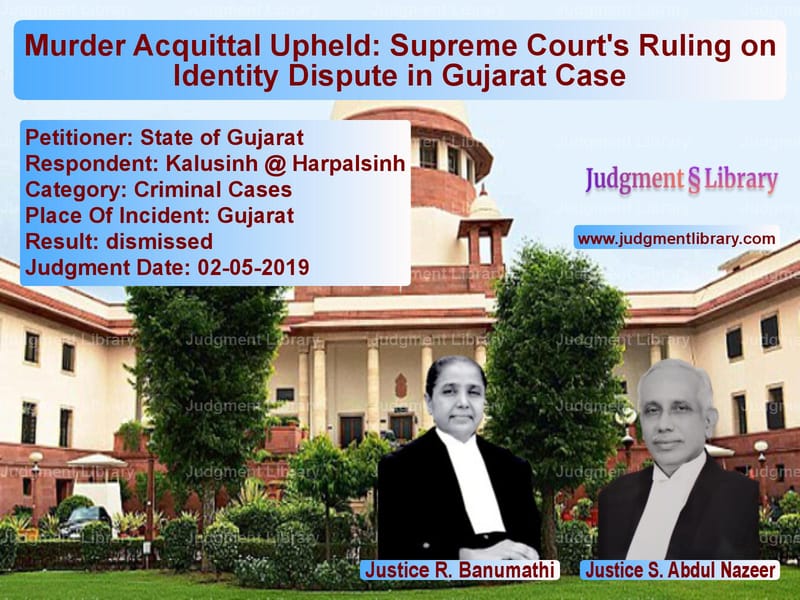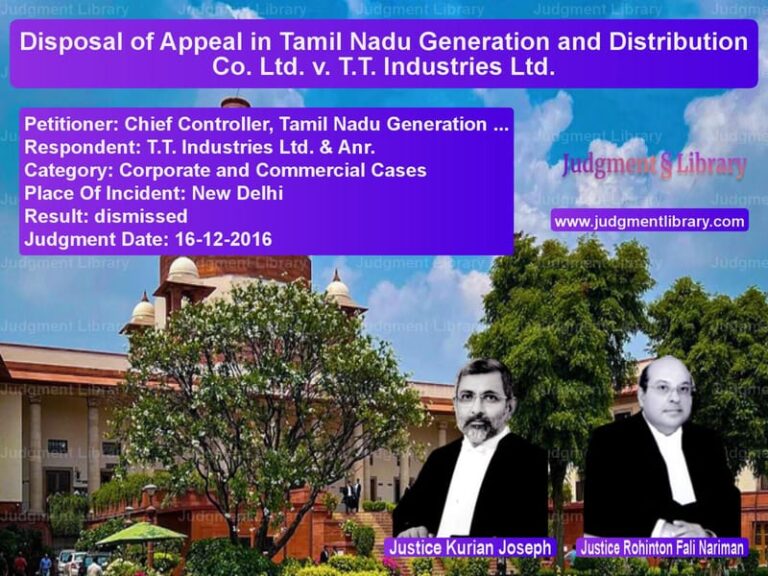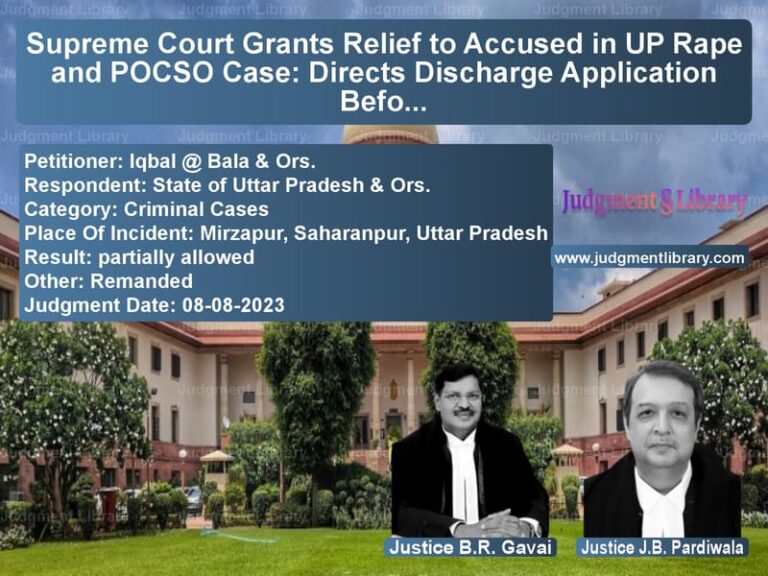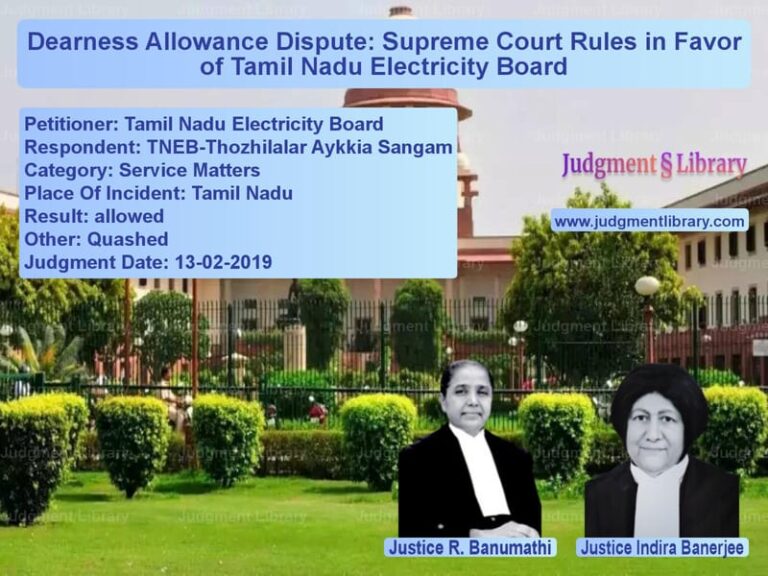Murder Acquittal Upheld: Supreme Court’s Ruling on Identity Dispute in Gujarat Case
The case of State of Gujarat vs. Kalusinh @ Harpalsinh involves a murder trial stemming from a land dispute in Gujarat. The prosecution alleged that the accused and others opened fire during a confrontation over land ownership, resulting in the death of one person and injuries to two others. The trial court convicted two accused under Section 302 of the IPC and related provisions, but the Gujarat High Court later acquitted one of them, Kalusinh, citing doubts about his identity. The Supreme Court was approached to review this acquittal.
The judgment sheds light on crucial legal principles, including the reliability of witness testimony, forensic inconsistencies, and the standards required to overturn an acquittal.
Background of the Case
The incident took place on 23rd November 1997, at around 9:00 PM, when a group of individuals, including the accused, was plowing disputed land. The complainant’s family objected, arguing that the land served as an access route for their home. This led to a heated altercation, during which gunshots were fired. The prosecution claimed that accused No.1, Ashok Singh, and accused No.2, Kalusinh, fired at the complainant’s family, killing one person, Somiben, and injuring two others, Ramanbhai (PW6) and Nandaben (PW7).
A complaint was filed the next day, leading to the registration of an FIR against six accused under Sections 302, 307, 120B, and related provisions of the IPC, along with the Arms Act and the Scheduled Castes and Scheduled Tribes (Prevention of Atrocities) Act, 1989.
Legal Issues Considered
- Whether the identity of accused No.2 (Kalusinh) was proven beyond reasonable doubt.
- Whether the forensic evidence corroborated the prosecution’s case.
- Whether the trial court correctly convicted the accused.
- Whether the High Court’s decision to acquit accused No.2 was justified.
- Whether the Supreme Court should interfere with an acquittal.
Arguments by the Petitioner (State of Gujarat)
- The prosecution’s eyewitnesses, including the injured victims, consistently identified Kalusinh as one of the shooters.
- The trial court found sufficient evidence linking the accused to the crime.
- The High Court’s reasoning regarding identity doubts was flawed and not supported by the overall evidence.
- The Supreme Court should reverse the acquittal and reinstate the conviction.
Arguments by the Respondent (Kalusinh @ Harpalsinh)
- There was no clear and consistent evidence proving his presence at the crime scene.
- Eyewitness testimonies were contradictory, with variations in who fired shots and from which weapon.
- The forensic evidence did not establish whether the fatal wounds were caused by a rifle or a shotgun.
- The High Court correctly applied the benefit of the doubt principle, as the prosecution failed to prove the case beyond reasonable doubt.
Supreme Court’s Observations
The Supreme Court reaffirmed that appellate courts should be cautious in overturning acquittals unless there is clear evidence of a miscarriage of justice. The judgment emphasized:
“In the absence of clear identification, it cannot be said that the High Court’s view was perverse or patently erroneous.”
The Court further observed:
“The burden lies on the prosecution to establish the identity of the accused beyond reasonable doubt. If reasonable doubts exist, the benefit must go to the accused.”
Key Findings of the Supreme Court
- The eyewitness testimony had contradictions regarding whether the accused actually fired shots.
- The forensic evidence did not conclusively link the injuries to a specific weapon.
- The trial court’s conviction relied on weak identification evidence.
- The High Court’s ruling was based on reasonable doubt and was a plausible interpretation of the evidence.
Final Verdict
The Supreme Court upheld the High Court’s decision, dismissing the appeal filed by the State of Gujarat. The acquittal of accused No.2, Kalusinh, was confirmed.
Implications of the Judgment
This ruling reinforces the principle that in criminal trials, the benefit of the doubt must go to the accused when identity is in question. It also underscores the Supreme Court’s reluctance to interfere with acquittals unless there is compelling evidence of judicial error.
The judgment serves as a reminder that convictions must be based on strong, consistent evidence and that forensic gaps can be pivotal in determining outcomes in criminal cases.
Petitioner Name: State of Gujarat.Respondent Name: Kalusinh @ Harpalsinh.Judgment By: Justice R. Banumathi, Justice S. Abdul Nazeer.Place Of Incident: Gujarat.Judgment Date: 02-05-2019.
Don’t miss out on the full details! Download the complete judgment in PDF format below and gain valuable insights instantly!
Download Judgment: State of Gujarat vs Kalusinh @ Harpalsin Supreme Court of India Judgment Dated 02-05-2019.pdf
Direct Downlaod Judgment: Direct downlaod this Judgment
See all petitions in Murder Cases
See all petitions in Attempt to Murder Cases
See all petitions in Judgment by R. Banumathi
See all petitions in Judgment by S. Abdul Nazeer
See all petitions in dismissed
See all petitions in supreme court of India judgments May 2019
See all petitions in 2019 judgments
See all posts in Criminal Cases Category
See all allowed petitions in Criminal Cases Category
See all Dismissed petitions in Criminal Cases Category
See all partially allowed petitions in Criminal Cases Category







